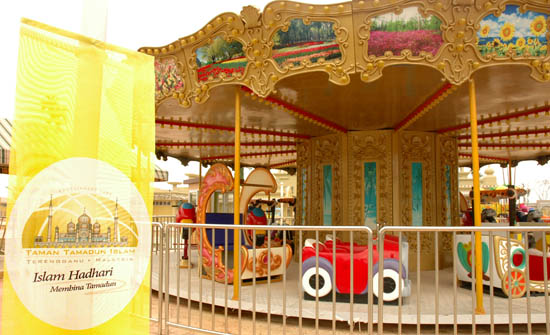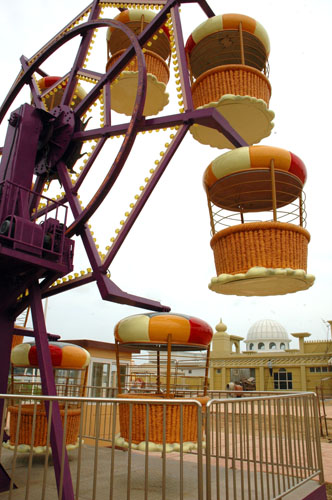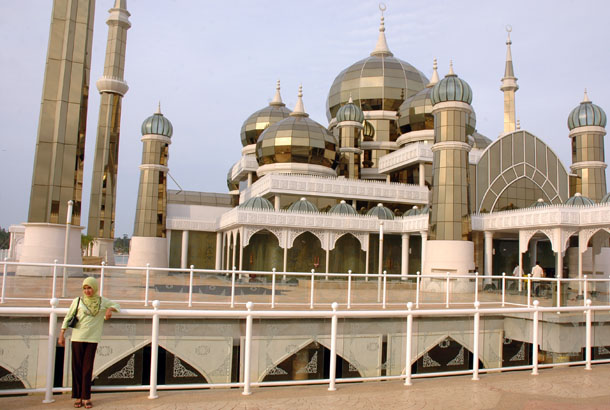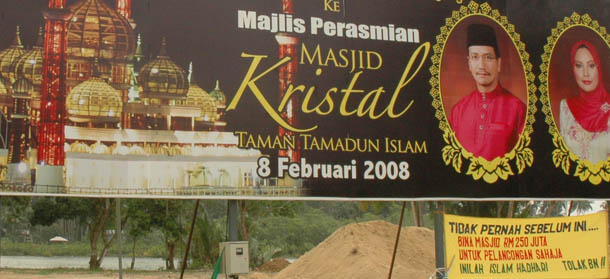By Farish A. Noor

THE merry-go-round is painted in bright hues of pink, yellow, green and blue; the slides and rides shine in the sun as the little girl contemplates which of the two plastic horses to mount first. Her mother sits by the swing in the near distance, her eye firmly fixed on the pride of five boys and girls frolicking around the sand pit and climbing ropes.
It would appear like any other children’s playground in any other suburban setting, save for the fact that the plastic palm trees are there to lend the place a somewhat exotic, middle-eastern feel: Welcome to the kiddies playground in the Islamic Civilisation theme park, one of the latest innovations bestowed upon the people of the state of Trengganu in Malaysia, as part and parcel of the Malaysian government’s attempt to promote its brand of Islam Hadhari (Civilisational Islam).
 Islam Hadhari was the brainchild of Prime Minister Datuk Seri Abdullah Ahmad Badawi after he became premier. The banner that hangs in front of the visitor’s complex carries the image of Abdullah, and the slogan: “Thank you for bringing Islamic civilisation to Trengganu.” (Though one would have thought that the Muslims there were already civilised long before…)
Islam Hadhari was the brainchild of Prime Minister Datuk Seri Abdullah Ahmad Badawi after he became premier. The banner that hangs in front of the visitor’s complex carries the image of Abdullah, and the slogan: “Thank you for bringing Islamic civilisation to Trengganu.” (Though one would have thought that the Muslims there were already civilised long before…)
Other attractions in the park include model replicas of famous mosques from around the world. As one drives through the main entrance, the first sight to greet visitors is a replica of Jerusalem’s Dome of the Rock, save that this model is diminutive in scale and ambition, and the gilded dome gives the uncanny impression that it is made of gold-painted plastic instead. I asked the construction worker how long it would take for the park’s completion, but speaking only Bengali, he could not understand me.
The Crystal Mosque
Right at the park’s end stands the so-called “Crystal Mosque” that is meant to be the theme park’s main attraction except that the mosque is not made of crystal. Rather, sheets of glass line its domes and minarets.
A crowd of Malay women meander around the floating mosque complex and laze about indifferently. I ask them where they are from and why they are here. One of them answers me in Kelantanese dialect: “We are from Kuala Lumpur and heading to Kelantan to vote.” I ask her if she and her friends are impressed by the Crystal Mosque. “It’s pretty, like a crystal toy. But it also looks a bit plastic to me. Is it finished yet?”

It is election season and the flag and poster war is being fought in earnest. The streets of Besut, Marang and Kuala Trengganu are lined with hundreds of posters and banners proclaiming the achievements of the ruling Umno party and the leadership of the prime minister. Since he came to power in 2004, Abdullah has pushed ahead with his agenda of inculcating the values of Islam Hadhari – said to be an approach to Islam that is moderate, pluralist and progressive – to win the hearts and minds of, in particular, Malaysia’s Malay-Muslim voters.
In the 2004 general election, Umno succeeded in wresting Trengganu away from the opposition PAS despite some allegations of electoral fraud. This was a significant victory for Abdullah because in the 1999 elections, Umno had lost the state to PAS in the wake of the reformasi movement following the unpopular sacking of then deputy prime minister Datuk Seri Anwar Ibrahim by then Umno president Datuk Seri Dr Mahathir Mohamad.
Who’s more Islamic?
However, despite Umno’s victory over this eastern state in the 2004 elections, PAS remains strong, and Trengganu is certainly a key state in the election. The election campaign here has returned to the old ways of the past, with both Umno and PAS claiming to be more Islamic than the other.

The Umno banners proclaim that over the past two years alone, the Umno government in Trengganu has built 62 mosques all over the state – a boast that has gained the state government a place in the Malaysian Book of Records, no less. PAS on the other hand retaliates by noting that the instances of absolute poverty in Trengganu is higher now than ever before, and that building mosques will not feed the people’s stomachs, or give them a better future. Right in front of the main entrance to the Islamic Civilisation theme park, the Islamists of PAS have erected a banner that reads: “RM250 million for a Mosque built for Tourists: What for?”
While the tone and tenor of the election campaign in the more urbanised, multiracial states of the west coast reflect the concerns of the urban middle-classes, here on the eastern coast of Peninsula Malaysia, another election is being fought altogether. The leaders of Umno and PAS continue doing what they do best, which is to assume the holier-than-thou posture beloved by Islamists and conservatives.
Umno claims that thousands of children below the age of 8 have read and memorised the Quran in Trengganu thanks to the efforts of Abdullah’s Islam Hadhari programme. PAS in turn responds by noting the cases of drug abuse, violence, prostitution and casual sex among the young in the state at the same time. Neither side really talks about the issue of democracy, human rights or an election campaign that is free, fair and transparent for all to see.
The few exceptions to the rule seem to come from the younger leaders of PAS who are more reformist-minded and policy-oriented. In the state capital of Kuala Trengganu (P36), PAS firebrand Mohamad Sabu goes round the local market and fishing villages calling for the return of democracy and the right to equal development.
Mohamad Sabu is contesting in a three-cornered fight for the parliamentary seat against incumbent Umno candidate Datuk Razali Ismail, and independent Maimun Yusuf. In Mohamad Sabu’s campaigning, for once, the common slogans of Islam, syariah and hudud laws are not mentioned. But such attempts at injecting some degree of political education into the campaign are few and far between, and sadly the election campaign that has been fought in the predominantly Malay-Muslim states of the northeast reflect the same parochial concerns of the 1980s and 1990s, with more than a little hint of communitarianism thrown into the bargain.
One wonders to what extent the campaign in Trengganu and the other Malay states has really been shaped and informed by Prime Minister Abdullah’s Civilisational Islam project. Thus far, little effort seems to have been made to civilise the conduct of the campaign, or to introduce ideas and themes that are really modern and progressive.
On March 4, with only four days before polling, the Election Commission (EC) suddenly announced it had to drop the idea of using indelible ink to mark voters’ fingers. With no other measure in place to placate fears of election rigging through multiple voting, the move has raised more questions about the EC’s independence and the irregularities that seem to haunt Malaysia’s general election. How these can be reconciled with the glittering empty mosque in the vacant theme park is an easy guess.
[Note: Kuala Trengganu total voters: 80,325; Malay (87.5%), Chinese (11.5%), Indian (0.7%), Others (0.2%).]
Dr. Farish A. Noor is senior fellow at the S. Rajaratnam School of International Studies at Nanyang Technological University, Singapore, and one of the founders of the www.othermalaysia.org research site.